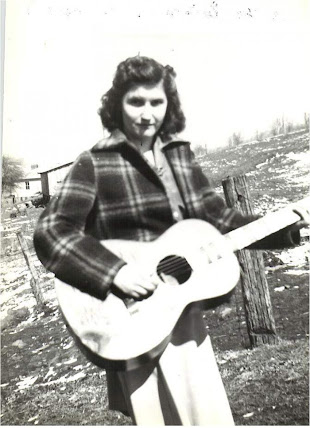Hazel Jane Dickens (June 1, 1925 – April 22, 2011) was an American bluegrass singer, songwriter, double bassist and guitarist. Her music was characterized not only by her high, lonesome singing style, but also by her provocative pro-union, feminist songs. Cultural blogger John Pietaro noted that "Dickens didn’t just sing the anthems of labour, she lived them and her place on many a picket line, staring down gunfire and goon squads, embedded her into the cause."
The New York
Times extolled her as "a clarion-voiced advocate for coal miners and
working people and a pioneer among women in bluegrass music." With Alice
Gerrard, Dickens was one of the first women to record a bluegrass album.
Hazel Dickens was born in Montcalm, Mercer County, West Virginia on June 1, 1925, the eighth of eleven siblings in a mining family of 6 boys and 5 girls. Many of Hazel's relatives were miners, including her brothers, cousins, and, eventually, her brothers-in-law. In the early 1950s she moved to Baltimore in search of work, and from her wages at a factory making tin cans she bought a bass so as to join her brothers in a bluegrass band playing for other Appalachian emigres. Around that time she met other devotees of old-time mountain music including Mike Seeger, younger half-brother of Pete Seeger and founding member of the New Lost City Ramblers and became active in the Baltimore-Washington area bluegrass and folk music scene during the 1960s.
During this time she also established a collaborative relationship with Alice Gerrard, who married Mike Seeger in 1970, and as "Hazel & Alice" recorded two albums for the Folkways label: Who's That Knocking (And Other Bluegrass Country Music) (1965) and Won't You Come & Sing for Me (1973). Dickens and Gerrard were bluegrass bandleaders at a time when the vast majority of bluegrass bands were led by men. Together, they recorded two additional albums on Rounder Records, but Hazel & Alice broke up in 1976 and Dickens pursued a solo career where her music and songwriting became more political.
Through the 70s, 80s and 90s, Hazel was regarded by many of her contemporaries as the finest female singer in hardcore bluegrass, and she performed with bands such as the Johnson Mountain Boys and the Nashville Bluegrass Band, and wrote songs such as Mama's Hand and You'll Get No More of Me.
Dickens used her music to try and make a difference in the lives of non-unionized mine workers and feminists. Dickens started to write more about the lives of miners and wrote a song titled "Black Lung" about her brother, Thurman, who died from the disease.
She wrote a song titled "Coal Mining Women" about the hardships women faced in the coal mining world. In 1978, Dickens performed at the Vandalia Gathering in Charleston, West Virginia, both solo and then with the former coalminer turned musician, Carl Rutherford. Dickens began to be seen as an activist and a voice for the working people.
She appeared in the Oscar winning documentary Harlan County, USA, about the struggle of the county's miners union against scab workers, wage rights, and health conditions; sung about on the picket line in her folk songs as well as contributing those four songs to the soundtrack of the film.
Her three solo albums for Rounder, Hard Hitting Songs for the Hard Hit (1981), By the Sweat of My Brow (1983), and It's Hard to Tell the Singer from the Song (1987), include old-timey country alongside protest songs and songs in a more contemporary country style. Rounder's A Few Old Memories distills the best of the three albums onto one disc.
Dickens received the Merit Award from the International Bluegrass Music Association in 1994 and was the first woman to do so. In 2001 she was presented with a National Heritage Fellowship by the National Endowment for the Arts, which is the United States' highest honour in the folk and traditional arts. Her last public performance was in March 2011 at the South By Southwest festival in Austin, Texas, where, her friend and frequent musical partner Dudley Connell says, "she pinned them to the wall". The following month Dickens died in a Washington DC hospice from complications of pneumonia. After her death, it was reported in major media that she had been born on June 1, 1935, but her relatives and public records confirmed the earlier date of June 1, 1925.
Stating that "music saves mountains," fans and supporters of Dickens' activism announced a special memorial, Tribute to West Virginia Music Legend Hazel Dickens at the Charleston, West Virginia Cultural Center on June 5, 2011. In 2017 Hazel and Alice Gerrard were inducted into the Bluegrass Music Hall of Fame, fifteen years after they received the Folk Alliance Lifetime Achievement Award.
(Edited from Wikipedia, AllMusic
& The Guardian)








4 comments:
Hazel Dickens, two albums. Have fun !
https://www.mediafire.com/file/6a4epoyh9cqx5oe/Hazel_Dickens.zip/file
Thanks a lot so much for this, a very rare and pretty one!
Never heard of her, so I'm curious
I forgot this one from 1973 with Alice Gerrard. Have fun.
https://www.mediafire.com/folder/mf7v3usulcaty/Hazel_Dickens_73
Post a Comment